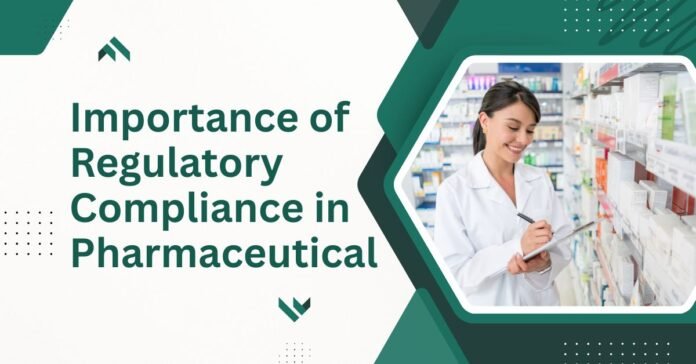Summary: Pharmaceutical regulatory compliance ensures that drugs and medicines meet strict standards for safety, quality, and reliability, protecting companies. With frequent recalls and heavy financial penalties for violations, adherence to regulations is critical for business continuity and reputation. As requirements become more complex, pharma compliance management software provides an efficient way to manage processes, reduce risks, and maintain trust across global markets.
Regulatory compliance forms the cornerstone of pharmaceutical operations, ensuring that drugs meet rigorous safety, efficacy, and quality standards before reaching patients. In an industry where lives depend on product integrity, adherence to regulatory frameworks like FDA, EMA, and ICH guidelines is non-negotiable. On average, 1,284 drugs are recalled every year highlighting the critical importance of maintaining compliance standards. The financial stakes are equally staggering—the pharmaceutical industry has faced over $126 billion in penalties. Compliance protects public health, maintains market access, and preserves company reputation. Non-compliance can result in severe consequences including product recalls, financial penalties, and legal action, making robust regulatory adherence essential for sustainable pharmaceutical business operations.
What is Pharmaceutical Regulatory Compliance?
Pharmaceutical regulatory compliance refers to the strict adherence to laws, regulations, and guidelines set by global health authorities to ensure the safety, efficacy, and quality of drugs and medical devices. Regulatory bodies such as the FDA (Food and Drug Administration), EMA (European Medicines Agency), and the World Health Organization (WHO) enforce these standards, ensuring that products are safe before reaching patients.
Key frameworks include Good Manufacturing Practices (GMP), Good Clinical Practices (GCP), and Good Distribution Practices (GDP), which regulate every stage of the pharmaceutical lifecycle—from research and development to manufacturing, distribution, and post-market monitoring.
By following these guidelines, pharmaceutical companies safeguard patient health, maintain product integrity, and build trust while avoiding legal and financial risks. Understanding this framework is crucial for sustaining quality, safety, and success in the highly regulated pharmaceutical industry.
Why is Regulatory Compliance Important in Pharmaceutical?
Ensuring Drug Safety and Efficacy
Patient safety is the top priority in the pharmaceutical industry. Regulatory compliance ensures that every drug is thoroughly researched, tested, and monitored before it is approved for use. Clinical trials must follow Good Clinical Practices (GCP), which require transparency, ethical standards, and scientifically validated results. By meeting these requirements, pharmaceutical companies can guarantee that drugs not only work as intended but also do not cause undue harm. This builds public confidence and reduces the chances of adverse events, recalls.
Ensuring Product Quality
From raw materials to final packaging, Good Manufacturing Practices (GMP) and Good Distribution Practices (GDP) establish strict protocols for every stage of drug production. Compliance ensures consistency in quality, proper storage, and accurate labeling, preventing contamination. Quality assurance systems and routine inspections by regulatory bodies further safeguard the integrity of pharmaceutical products. High product quality not only protects consumers but also strengthens the brand reputation of pharmaceutical companies.
Facilitating International Trade
Pharmaceutical companies aiming to distribute drugs globally must meet international regulatory standards. Compliance with frameworks like those enforced by the FDA, EMA, and WHO allows for smoother approvals in multiple markets. This alignment ensures that drugs can be safely exported and imported without facing regulatory barriers. By following globally recognized practices, pharmaceutical companies can expand their reach, improve accessibility to life-saving medications, and strengthen international partnerships in the healthcare industry.
Accelerating Time-to-Market Without Compromising Safety
While compliance may seem time-intensive, it actually streamlines the drug approval process. Well-prepared documentation, validated clinical data, and robust quality management systems reduce the chances of delays or rejections during regulatory reviews. This means pharmaceutical companies can bring products to market faster while still upholding the highest standards of safety and efficacy. In a competitive industry where speed and reliability are critical, compliance provides the balance between innovation and responsibility.
Key Areas of Pharmaceutical Regulatory Compliance
Good Manufacturing Practices (GMP)
Health Canada requires all pharmaceutical manufacturers, importers, and distributors to comply with GMP regulations. These standards govern facility design, equipment, sanitation, employee training, and quality control systems. Inspections by Health Canada verify that companies consistently produce safe, effective, and high-quality medicines. Without GMP compliance, firms cannot legally manufacture or distribute drugs in Canada.
Good Laboratory Practices (GLP)
GLP regulations apply to non-clinical laboratory studies, including preclinical safety and toxicology testing. In Canada, GLP compliance ensures that laboratory data is reliable, reproducible, and valid for regulatory submissions. This framework is essential for companies seeking approval to advance their products into clinical trials under Health Canada’s Food and Drugs Act and Regulations.
Good Clinical Practices (GCP)
GCP governs the ethical and scientific standards for conducting clinical trials in Canada. Health Canada requires sponsors to follow GCP to protect participants’ rights, ensure accurate data collection, and maintain trial integrity. Adherence to GCP is mandatory for obtaining regulatory approval to conduct human studies and is closely monitored through regular inspections.
Good Distribution Practices (GDP)
Health Canada enforces GDP standards to ensure the proper storage, handling, and transportation of pharmaceutical drug products. This framework protects medicines from contamination, damage, or temperature fluctuations during distribution, ensuring patients receive safe and effective products.
Strengthening Compliance with Pharma Compliance Management Software
Regulatory compliance is vital for building trust, protecting patients, and ensuring sustainable success in the pharmaceutical industry. With evolving regulations and increasing complexity, pharma compliance management software helps companies maintain accuracy, streamline processes, and reduce risks. By leveraging technology, pharmaceutical organizations can ensure consistent adherence to standards, safeguard product quality, and strengthen market reputation. Effective compliance management is not just about meeting requirements. It is about driving excellence and reliability in every aspect of operations.



